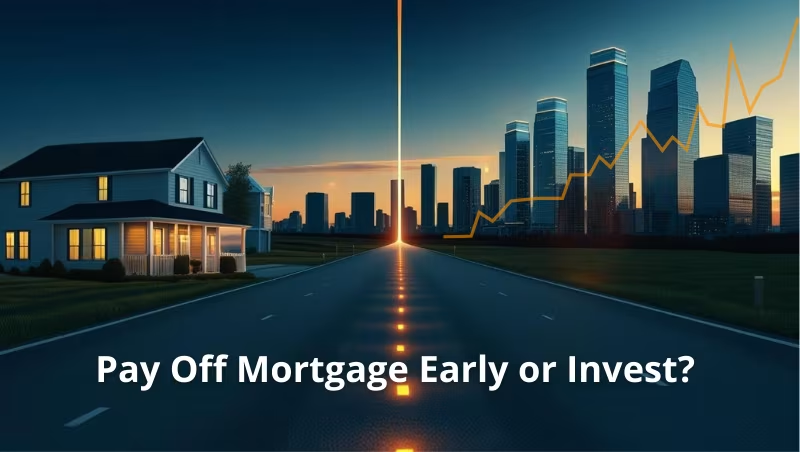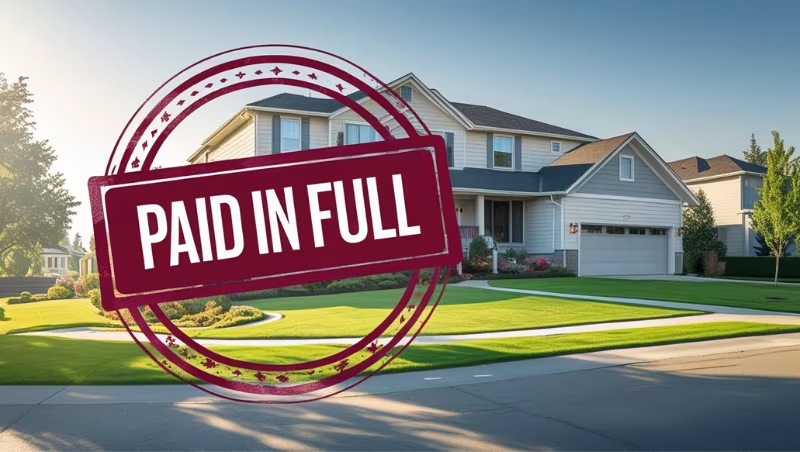Try it now!
Managing your investments has never been easier!

Should you pay off your mortgage early or invest instead? It’s one of the biggest money questions homeowners face. Paying extra toward your mortgage gives you a guaranteed return equal to your interest rate, while investing can deliver higher long-term growth, but with more risk.
The right answer depends on more than just math. Your mortgage rate, retirement plans, risk tolerance, and financial priorities all play a role. In this guide, I’ll break down when paying off makes sense, when investing may be smarter, and how you can balance both.
The mathematics don't always tell the complete story when choosing between investing and mortgage acceleration. Certain situations make paying down your mortgage the clear winner, regardless of potential investment returns.

Paying off a 7% mortgage gives you a guaranteed 7% return on your money — no market risk, no volatility, just pure savings. If your mortgage rate exceeds what you could reasonably expect from investments, the decision becomes straightforward. This guaranteed return beats hoping for market gains that may or may not materialize.
Some homeowners discover exceptional psychological value in owning their home outright. The comfort of never facing another mortgage payment provides measurable peace of mind that extends beyond pure financial calculations. For many people, this emotional benefit outweighs potential investment returns. There's real value in sleeping better at night.
Housing costs represent about 33% of a typical family's budget1. Eliminating your mortgage before retirement creates significant monthly expense reduction and greater flexibility when living on a fixed income. This strategy might even allow you to delay claiming Social Security, potentially increasing your lifetime benefits.
Market volatility isn't for everyone. If stock market swings keep you awake at night, paying down your mortgage offers guaranteed returns without risk. You'll reduce monthly obligations while gaining flexibility for future financial decisions. Sometimes the best investment strategy is the one you can actually stick with long-term.
Paying off your mortgage guarantees savings, but investing often delivers superior long-term results under the right conditions.

Homeowners with mortgage rates below 4.5% face an important financial trade-off. The S&P 500 has historically returned about 10% annually6 in nominal terms (around 6–7% after inflation). That creates a meaningful gap between your borrowing cost and the potential long-term gains from investing.
For example, investing an extra $300 per month instead of making additional mortgage payments could grow to roughly $133,000–$147,000 over 19 years at a 10% return7, depending on compounding assumptions. By contrast, the same money put toward early mortgage payoff would save far less in interest at a 3.5% rate.
Employer matching programs offer free money that mortgage prepayment simply can't match. In 2025, workers aged 50 or more can contribute up to $31,000 in their 401(k) plans—$23,500 in standard deferrals plus a $7,500 catch-up allowance. For those aged 60–63, the new “super catch-up” provision allows for contributions up to $34,750, with an $11,250 catch-up limit, assuming their plan supports it2. Missing these enhanced contribution opportunities in favor of accelerating mortgage payments can be a costly decision — your future retirement income depends on maximizing these retirement savings now.
Home equity locks up your money. Investments don't. This accessibility provides crucial financial security for emergencies or opportunities. Tax advantages through RRSPs and TFSAs can enhance your investment returns significantly, whereas mortgage prepayments offer no comparable tax benefits4.
What happens when you need $20,000 for your child's education or a medical emergency? Investment accounts provide immediate access. Your home equity requires lengthy refinancing or selling.
Markets fluctuate, but diversification across fixed income, equities, and alternative assets creates balanced portfolios aligned with your risk tolerance. Accepting some volatility might lead to substantially greater long-term wealth compared to the guaranteed but limited returns from mortgage prepayment.
The key difference? Higher returns come with corresponding risks — unlike mortgage paydown, which guarantees savings but caps your upside potential.
Online calculators can simplify this analysis by modeling both scenarios with your actual numbers. These tools show you the long-term impact of each choice, though I'd caution that results are projections, not guarantees. The real value lies in seeing how different assumptions affect your outcomes.
Mortgage interest may be tax-deductible if you itemize, though this benefit became less common after 2018 when the standard deduction nearly doubled3. Only households with larger deductions, such as high mortgage balances or significant state and local taxes, typically benefit.
Meanwhile, inflation works in your favor with fixed-rate mortgages. As wages and prices rise, your monthly payment stays the same, meaning you’re effectively paying back tomorrow’s debt with tomorrow’s cheaper dollars.
Investment returns also face taxes. A 10% stock market gain may shrink to 7–8% after taxes5, depending on whether it’s taxed as capital gains or ordinary income. This narrows the gap between investing and mortgage prepayment benefits, though investing often still provides higher long-term potential.
A combined strategy can make sense if your mortgage rate is reasonably high—close to or above the long‑term average returns you might expect from investing. In that case, splitting extra funds between mortgage payments and investments captures both guaranteed savings and potential growth. Windfalls like tax refunds or bonuses can be divided to accelerate multiple goals, while an emergency fund of three to six months’ expenses provides security before making aggressive payments. Retirement contributions should also remain a priority—capturing your full employer match is essentially free money. If your mortgage is very low, around 1–3%, the financial case for extra payments weakens, and a blended strategy is more about psychological comfort than maximizing wealth.
There’s no universal answer to whether you should pay off your mortgage early or invest instead — it depends on your interest rate, financial goals, and risk tolerance. Paying off your mortgage offers certainty, peace of mind, and lower expenses, while investing provides higher growth potential and flexibility. Many homeowners find balance by doing a mix of both.
The smartest move is to run the numbers for your own situation and align your choice with both the math and your personal comfort. Tools like 8FIGURES make this easier by comparing scenarios with your actual data — so you can see whether investing, paying down debt, or a blended strategy puts you in the best position to build wealth and reach financial freedom.
REFERENCES
Managing your investments has never been easier!